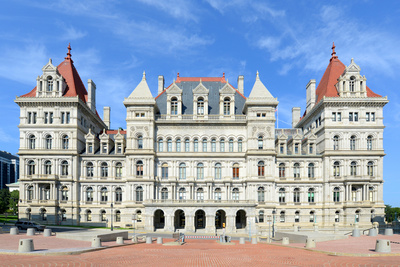With most state legislatures having adjourned their 2017 sessions, now is a good time to review activity on sales and use tax (SUT) compliance legislation this year (see our May update
here). Lawmakers in 31 states have introduced 80 sales and use tax compliance bills this year, and in the executive branch, five states have proposed five regulations. (Note that we've removed the bills that began as SUT compliance legislation but were later amended to no longer address this issue.) While many of these bills are in states that
have adjourned or are close to adjourning, the sheer volume of introduced legislation is still instructive.
What exactly are these bills trying to do? The purpose of all of them is the same: to promote collection of sales taxes by as many sellers as possible (including remote sellers) in the absence of congressional action.
A few months ago, the Marketplace Fairness Act (
S. 976) was introduced in the U.S. Senate and the Remote Transactions Parity Act (
H.R. 2193) was introduced in the U.S. House of Representatives. These bills would allow states to require certain remote (including online) sellers to collect sales tax, subject to specific stipulations. According to a press release from the Marketplace Fairness Coalition, the law, if enacted, “would only apply to online sellers that have sales of at least $1 million outside of states where they have physical operations, like a store or a warehouse.”
But until Congress enacts a federal law, states are pursuing their own solutions. These bills have used a variety of strategies to enhance sales tax compliance, which we've grouped into three broad categories:
- Economic Nexus Bills. These bills set aside “physical presence” as the standard for state authority to require sellers to collect sales taxes. Instead of focusing on physical presence, these bills set a bright line sales thresholds (in dollars or number of transactions or both), with sellers exceeding these thresholds required to collect legally due and payable sales taxes. These measures were inspired initially by U.S. Supreme Court Justice Anthony Kennedy, who, in his concurring opinion in DMA v. Brohl, invited the legal system to present the Court with a case that would allow it to revisit its holding in Quill. However, some policymakers are also of the opinion that modern e-commerce can be distinguished from the facts in Quill and physical presence isn't the correct standard for this new commerce—after all, they argue, the internet wasn't even legally available for commercial activity when Quill was decided. Regardless, these proposals are generating new revenue in the states which have already implemented economic nexus—Alabama and South Dakota being the first two—which is garnering notice from other states.
- Expanded Nexus Bills. These bills aim to extend the physical presence standard within (arguably) the existing constitutional framework. Many non-practitioners mistakenly believe that “physical presence” means that a retailer must have a store or a distribution center or own some other real estate in a state to be subject to sales tax collection. In reality, the various Supreme Court cases have never defined “physical presence,” making the “bright line” quite murky. Yes, physical presence includes ownership of real estate, but it also has been interpreted to extend to activities of affiliates, agents, and others who are acting on behalf or in conjunction with the remote/internet seller. Examples of these “expanded nexus” bills include affiliate nexus, click-through nexus, and drop ship nexus. This category also includes extending the imposition of a sales tax collection obligation to new economic actors, such as marketplaces (assuming they have traditional nexus with the state; if they do not, then the bill falls under economic nexus).
- Non-Nexus Collection Bills. Other sales tax compliance bills that don't address the nexus question often require out of state sellers to inform their buyers about the responsibility to pay sales tax on their purchases, typically with an annual mailer. Colorado pioneered this approach, leading to the aforementioned Supreme Court decision (albeit on an ancillary issue). Opponents of the Colorado reporting law failed in their attempts to gut it this year in the legislature.
Note that some states have bills with language that falls in more than one of these categories, combining, for example, economic nexus and reporting language (e.g., Nebraska). Check out the map below to see which states have considered (or are considering) sales tax compliance legislation in 2017, and what types of bills/provisions each state has introduced. For details on how to read this map, please see the notes below the image.
Of these introduced bills, several have made legislative progress:
- Bills have been enacted in Alabama (AL SB 86), Indiana, (IN HB 1229), Maine (ME LD 1405), Minnesota (MN HF 1A), North Dakota (ND SB 2298), Ohio (OH HB 49), Virginia (VA HB 2058, VA HB 1500, and VA SB 962), Vermont (VT HB 516), Washington (WA HB 2163 — governor is expected to sign legislation), and Wyoming (WY HB 19).
- Bills in several other states advanced past their chamber of introduction (in Arkansas, Georgia, Hawaii, Indiana, Kansas, Minnesota, Mississippi, North Carolina, New Mexico, Pennsylvania, South Carolina, Texas, Utah, and Virginia). Many of these states' regular sessions have adjourned, although carryover is possible in some of them. More information on session dates and carryover can be found here (note that blue rows indicate states that have adjourned).
For an explanation on current state laws regarding sales tax compliance, see
this blog post from earlier this year. For more details on all of the legislation proposed this year, please
contact us.




